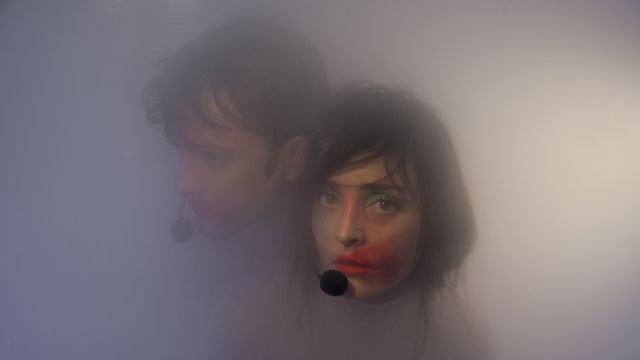The Irresistible
It’s so wonderful to see the little-explored genre of science fiction on stage in a theatre. Of course it’s harder in theatre to create the special effects you see in a science fiction film, so it’s easy to see why writers and directors might avoid it like the plague. The Irresistible shows us all you can do sci-fi very well on stage very well indeed, special effects and all!
The show consists of parallel narratives and a slew of characters adeptly played by two leads Adriane Daff and Tim Watts. Stories bleed from one to another quite impeccably. There’s a moodiness and tension worthy of a Hitchcock movie. Strange lights in the sky, black ooze and a child with otherworldly powers all add to the thrilling tales. There’s also a love-struck lawyer and the object of his affections, Neve a sex-worker; an emasculated parking inspector and a doctor dealing with the shocking death of her sister.
Reading that description, you might be surprised to hear it’s also hilariously funny. Zoe Pepper, Adriane Daff and Tim Watts have done a great job to keep the script at once comical, current and gripping. The tightly-scripted show explores themes of gender politics, family expectations and obligation in relationships. It also looks into gas-lighting and the damage it can cause to a relationship. The Irresistible challenges you to explore your own unconscious assumptions about people based on class, job and sex.
Much of the success of the visual special effects was due to the lighting design by Richard Vabre and the set and costume design by Jonathon Oxlade. The creative use of smoke machines, plastic partitions and black slime was simple, effective and impressive. Actors Adriane Daff and Tim Watts are fantastic as slipping between characters, ably aided by autotune and other vocoder effects. The actors wear microphones that allow them to manipulate their own vocal tone. The clear plastic sheets that separate audience from performers also helps the vocal effect by muting the actors’ real voices.
Our society is hurtling toward an inevitable equality. The voices of the once disenfranchised are getting louder and being heard. Those whose privilege and power is threatened by discussions such as those contained in this play will find the work threatening. So they should. Theatre like this is powerful. It educates; it changes minds. At the very least, it opens up the conversations we need to be having now and into the future.
Kiesten McCauley
Photographer: David Collins.
Subscribe to our E-Newsletter, buy our latest print edition or find a Performing Arts book at Book Nook.

